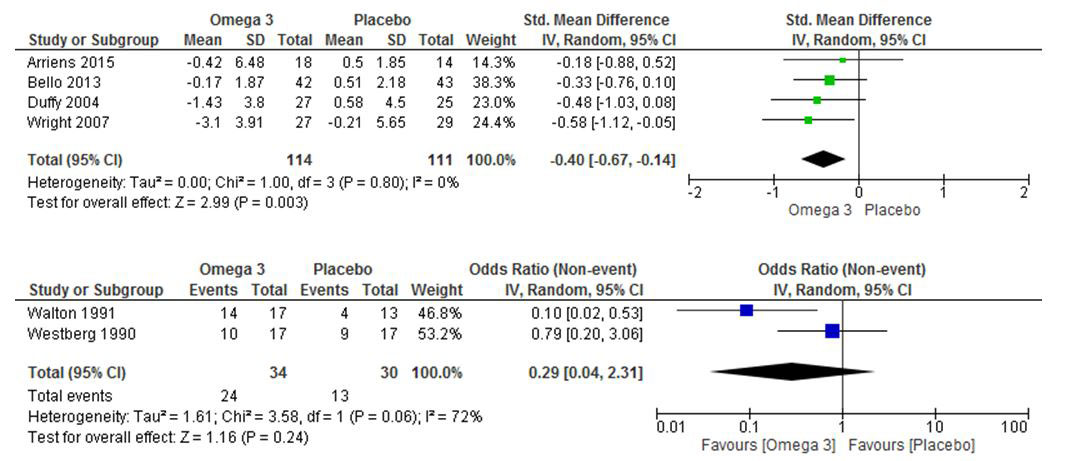Session Information
Session Type: Poster Session (Tuesday)
Session Time: 9:00AM-11:00AM
Background/Purpose: Omega-3 fatty acids may have anti-inflammatory properties. In animal models of systemic lupus erythematosus (SLE) Omega-3 fatty acids decrease autoantibody levels, reduce inflammatory markers and prolong the lifespan of lupus-prone mice. However clinical studies in patients with SLE have been small, with wide confidence intervals and conflicting findings. Thus, we aimed to perform a systematic review and meta-analysis to determine a more accurate and precise estimate effect of omega-3 fatty acids on SLE disease activity in adults.
Methods: Following an a priori established protocol, a comprehensive search in any language of several databases designed by two expert librarians was conducted from database’s inception to January 11th, 2019. Studies that were randomized controlled trials (RCT) of adults with SLE comparing omega 3 fatty acids supplementation to placebo or standard of care and reported SLE disease activity were included. Abstracts and full text reviews were evaluated independently and in duplicate by two investigators.
To combine outcomes, we standardized the disease activity scales (SLEDAI and SLAM) into standardized mean differences (SMD). Since small sample sizes can lead to biased overestimation of the SMD, we used Hedges’ (adjusted) g methods. For continuous outcomes we calculated the SMD and 95% confidence interval (95CI), we used the inverse variance approach random-effects model. Dichotomous outcomes were reported as odds ratio (OR) and 95CI. Heterogeneity was calculated with the I2 statistic. Results were presented in standardized mean response for SLE disease activity and 95CI. To improve clinical interpretability, the pooled data was scaled back to the SLEDAI by multiplying SMD by standard deviation of the studies that utilized SLEDAI.
Results: Six studies were included in the meta-analysis. The studies were published between 1990 and 2015. All the included studies were RCTs. The treatment group sizes ranged from 8-43 patients (median 20). In total 180 patients were in the comparison groups and 183 in the treatment groups. Half of the studies utilized the usual dose 3 grams or less of Omega 3 fatty acids while the rest used up to 20 grams. The trial follow-up time ranged from 22 – 52 weeks. The mean age of the patients was 43.2 years and 80% or more were female.
Four RCTs with 225 participants had continuous outcomes, 2 used SLEDAI and 2 used SLAM to measure SLE disease activity. As shown in the figure, the SMD of the included trials ranged from -0.18 (95CI, -0.88, 0.52) to -0.58 (95CI, -1.12,-0.05). The pooled SMD was -0.4 (95CI, -0.67, -0.14). We transformed the SMD to units of the SLEDAI scale. Compared to placebo, Omega 3 fatty acids reduced disease activity by 1.4 (95CI, -2.9, -1) SLEDAI points. The statistical heterogeneity was low with an I2 of zero.
Two RCTs with dichotomous variables were included in the analysis. 64 patients were part of these studies. The pooled odds ratio was 0.29 (95CI, 0.04, 2.31). The statistical heterogeneity was high with an I2 of 72%.
Conclusion: This meta-analysis evaluated the efficacy of Omega-3 fatty acids for the treatment of SLE. Our results suggest that Omega-3 fatty acids are a potential therapy that can be added to the immunosuppressive treatments used for SLE.
To cite this abstract in AMA style:
Duarte Garcia A, Myasoedova E, Karmacharya P, Crowson C, Warrington K. Effect of Omega-3 Fatty Acids on Systemic Lupus Erythematosus Disease Activity: A Systematic Review and Meta-Analysis [abstract]. Arthritis Rheumatol. 2019; 71 (suppl 10). https://acrabstracts.org/abstract/effect-of-omega-3-fatty-acids-on-systemic-lupus-erythematosus-disease-activity-a-systematic-review-and-meta-analysis/. Accessed .« Back to 2019 ACR/ARP Annual Meeting
ACR Meeting Abstracts - https://acrabstracts.org/abstract/effect-of-omega-3-fatty-acids-on-systemic-lupus-erythematosus-disease-activity-a-systematic-review-and-meta-analysis/

